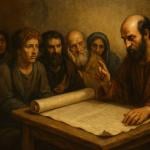Standing Out From the Crowd
Luke 17:11-19
I think it was Rick Goodman who commented recently: “It’s such a shame that I feel like I learn the most about somebody from their obituary!”
Sad but often true, I’m afraid. There are people with whom we live day in and day out, about whom we probably feel we know everything there is to know. But there are always new things to be learned. Always. That’s a good reminder to be curious about the world in which we live and the people who fill our lives—there’s always more to learn.
The very same thing is true about the Bible. I’ve known people who do the “read the Bible in a year” routine every single year and I know for sure never to ask, “Haven’t you heard that all before? Don’t you want to try something new?” because there’s a similar quality of perpetual discovery to scripture—layers of meaning and new things to discover in the words and in between the words, even in the passages and stories that seem all too familiar to you and me.
Well, that’s where we’re going today. Today’s Gospel passage might sound familiar to you . . . I hope it does, actually. We selected it for worship a few weeks ago in our recent series on conversations Jesus had in the Gospel of Luke. Today we return to the Revised Common Lectionary assignments for worship and find that this very same story has been selected for our Gospel passage today.
“We already did that!”—we could take that approach. After all, there are tons of scripture passages we never get around to every year, even passages in the Gospel of Luke that we probably won’t read this year. Why spend another Sunday looking at the same passage we studied just a few weeks ago?
Well, this may not surprise you, but I thought a repeat performance of the Gospel text was a unique and wonderful opportunity to approach our text, yet again, as serious students. Because, we can know the stories inside and out, but we should never think that just because the story is familiar that there is nothing new for us here. Instead, there are ALWAYS things we didn’t know about a text! What a great opportunity we have today to go deeper than we might have gone before, to look at another segment of the passage, to turn it upside down and inside out and think in totally new ways about something you thought you always knew. Excited??
Let’s review: we’re in the seventeenth chapter of Luke. Jesus has started his trek toward Jerusalem, where he (and we) know what awaits him there. He happens today to be somewhere on the border between Samaria and Judea, a place where one would not be surprised to run into a Samaritan. Lukan scholars don’t know why Jesus would find himself in this region…it’s not really on the way to Jerusalem, if you’re taking the direct route, anyway. Because of that, scholars seem to think that Luke used this location as a narrative tool to give us some clues about the kind of Gospel Jesus was preaching, the kind of kingdom of God he was trying to create.
Instead of heading straight toward Jerusalem and the Temple, the center of Jewish life and religion, Jesus took a strange, circuitous route, wandering outside the lines into places he was sure to encounter strange people, people outside the norm of regular Jewish faith and practice. Maybe Luke is trying to tell us what we might not have known until we read Jesus’ obituary 2000 years later . . . that this Jewish rabbi was up to something different, that he had a unique and radical vision of what the kingdom of God might look like.
So, along the way Jesus’ GPS got a little confused and Luke tells us he was on the outskirts of Jewish territory, getting ready to enter into a village whose name we are not told. Right before he goes in, ten lepers approach him, calling out from far off: “Jesus, have mercy on us!” They wanted to be healed, and presumably word of Jesus’ ability to heal even leprosy had spread far and wide.
And, let’s face it, they were desperate. Because of their illness they were completely excluded from society on all levels. Their status as outcasts bound them together, and in that pack of ten there was something that happened nowhere else in society: Samaritans and Jews, finding their common ground in the fact that they had lost their homes, their families, their communities, formed a community. And they realized that there was one thing and one thing only that drew them together: they were sick, and they wanted deeply, desperately, to get better. If they could…if, somehow, their leprosy would be cured, they could go to the priests, be examined, and return to society like they had been living before they got sick.
And so there they were, crazy with hope and excitement, trying to think of whatever they could do to get Jesus’ attention in the faint hope that he would heal them like he had that other leper about whom they’d heard.
But Jesus doesn’t even approach them, and he certainly doesn’t touch them like he did the other leper in Luke, chapter 5. He just calls out and keeps walking, tells them to go ahead and see the priest, to take their disease-riddled bodies to the synagogue and undergo the ritual examination. No fireworks or magical words, just “go to see the priest.” And who knew? Who knew if they were gathering up their things and heading to the synagogue as Jesus directed them, or if they turned away disappointed, muttering under their breaths that what was the point of trying anyway: things were hopeless, and they would probably stay that way.
At some point, the text doesn’t tell us exactly when or how but it must have been almost immediately, they all began to notice their leprosy disappearing. Maybe their skin tingled a little bit and they glanced down to see a pock-marked arm suddenly smooth. Or maybe the tips of fingers that had rotted off their hands began to grow back and hands that were disfigured were, in that moment, restored to normal. I don’t know how it happened . . . and how it happened is probably not the point. No matter, they couldn’t believe it. They were being healed. And so they hurried toward the priests, speeding up in the direction they’d been headed after Jesus passed them by. After all, he’d told them to do that, didn’t he? He did! And so they were.
But the story ends with one leper, the tenth, a Samaritan, stopping. As soon as he realized his skin was healing, he stopped, turned around, and started crying. Wailing, I’d bet. I’d guess he raising his arms toward the sky, saying things like, “Holy God! How can this be? For so long I’ve prayed and waited and hoped . . . I never thought, I never, ever thought I could be healed. I had almost lost hope altogether, but the rabbis were right: you are a God who hears my prayers and listens to my anguish. For caring enough to hear me and to heal me, know my gratitude….” Then, he ran to Jesus. He fell down at Jesus’ feet. He thanked him. Over and over he thanked Jesus for another chance at life.
The conversation that comes next was the one we looked closely at a few weeks ago—Jesus tells the Samaritan leper to go on his way, that his faith had not only healed him but had also made him whole in ways he hadn’t even known he needed.
But I think it’s Jesus’ confusion here that’s worth another look this week, because it might be a clue for us about how it is we are asked and even expected to live our lives in response to the incredible gifts of faith and relationship with God. Jesus is confused—“Funny . . . last time I checked, there were ten lepers in your group, ten of you calling out to me, begging desperately to be healed. Was I seeing things? Am I wrong?? And, yet when I look out I see only you, a Samaritan, returning to say thank you.”
I can clearly remember when my oldest child, Hayden, came home from kindergarten for the first time with a paper that had less than a smiley-faced “A” marked at the top. I can’t remember what it was…maybe a math paper on which he had missed a few problems or something like that. It was the first time he was experiencing the harsh reality of grading, and he was devastated.
My own life flashed before my eyes in that moment. I remember stern talks from my own parents whenever I brought home grades that were less than perfect. I remember my devastation at a GPA just short of a 4.0 my senior year in high school. Crushed. And in that moment of Hayden’s distress I racked my brain, trying to think about how I might parent differently.
Of course, everybody wants to parent differently than their parents did, determined to correct the egregious mistakes of their own childhoods. The truth of the matter is, of course, that my parents set out rigorous expectations for my accomplishment with all good intentions: they wanted me to succeed in school.
But I was going to do it differently (and right). I thought and thought of how best to respond to my little kindergartener desperate for a sticker. And here’s what I came up with: “Did you do your best work?”
Tearfully, he nodded and told me he just was confused about one of the math rules the teacher had taught them that week.
“Well, all I expect is that you always, always do your best work. Nobody’s perfect, but our work will always stand out if we do the very best we can in every situation.”
I could talk for hours about the parenting mistakes I know that I have made, but I have to say that I think that conversation with Hayden might have been an inspired moment. “Do your best work!” It’s a phrase I repeat often, that subsequent kids have learned, and that we all remind each other, in the context of schoolwork or anything else really. Do your best work. Always do your best work. Your effort and contribution will always stand out if you are someone who consistently, conscientiously does her best work.
I believe this may also be an axiom of life. That is, “do your best work” might actually apply to more than kindergarten math assignments. It can apply in whatever we set our minds and our hands to do, and it certainly can, and should, apply to our relationship with God. Don’t you think?
While saying thank you is definitely part of doing your best, I don’t really blame the 9 other lepers for picking up their pace toward the temple when they saw that their skin was healing. Do you? After all, it was Jesus himself who told them to go show themselves to the priests, and they were following his direction for sure. Plus . . . they could see right within their reach, that elusive hope they had only dreamed of. They had been excluded from their communities. They were missing their families. They were homeless and without the basic necessities of life. Suddenly, in that moment, they could see what they had hoped beyond hope for—healing. And all they wanted to do, really, was to rush home, to throw their arms around their children, to sleep in their own beds. Who can blame them?
But maybe the tenth leper had always learned that, in every situation, you always—without exception—you always do your best. And who, pray tell, is given their very life back, who receives the most incredible gift they could ever, ever receive—their very life, in fact—and doesn’t stop to say thank you? Why, that wouldn’t be doing your best, would it? Doing your best for God would be instead remembering, in that moment and in every single moment of life that comes after, that we are deeply, effusively, inexplicably grateful.
That we live, in every moment of our lives, the deep truth that everything we have and everything we are . . . that our very lives themselves come to us from God. They are gifts from God.
This week is the first of three weeks during which we’ll be talking about stewardship—how it is that we structure and live our lives, especially within the context of this community, in order to reflect our deep gratitude to God, our acknowledgement that everything we have and everything we are belongs, not to us, but to God. Our stewardship team will lead us through that exploration, and on October 24th in worship, together we’ll lay our pledge cards on the altar as our individual and corporate expressions of public gratitude.
We don’t just want to be people who go through life oblivious to the very source and gift of who we are. We want to stand out from the crowd, to live lives that reflect our acknowledgement of God’s goodness to us. That’s the difference. That was the difference between the 9 lepers who were just doing what they were told—nothing wrong with that—and the tenth leper, who stood out from the crowd.
That leper knew, as we know when we choose to live this way, the deep and foundational truth a life of gratitude toward the one who creates and heals and sustains us. Yes, we know that a life lived praising and thanking God, that is the life that ultimately stands out from the crowd.
Amen.















